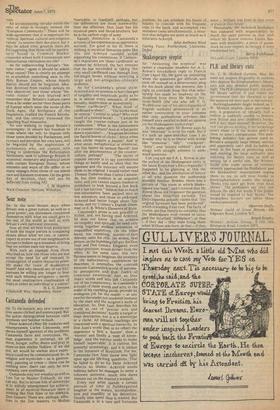Shakespeare sceptic
Sir: -Answering the sceptical" was rather a charitable headline for A. L. Rowse's knockabout reply to Francis Carr (April 19). He gave up answering
when the questions got difficult, and took off instead on a diversionary plug for his book about the sonnets. Am 1 right to conclude from this that scholarship has made no headway on the Stratford front since Mr Martin Seymour-Smith (the one who left P. G. Wodehouse out of his encyclopaedia of English authors) pronounced in an earlier controversy in your columns that only professional scholars like himself were entitled to hold an opinion on the Shakespeare authorship?
In the same spirit Mr Rowse says he was "reluctant" to write his reply. But if it's such an open-and-shut case I do wonder why he is so liberal with words like "nonsense", "silly", -crackpots", "dotty", and "lunatic rubbish", and so stingy with straight answers to awkward questions.
Can you tell me if A. L. Rowse is also the author of the Shakespeare entry in the latest Everyman's Encyclopaedia? I happened to be glancing at this the other day, and the attribution of lunacy to all who question the authorship sounded familiar. Besides, there was a picture of 'the room in which Shakespeare was born", and i noticed that Mr Rowse chose not to answer the question about the Stratford swindle. The Encyclopaedia actually claims that "the original furniture has been preserved", which is nothing if not cool. The facts, of course, are that there's no certainty that the Shakespeare ever owned or occupied the Stratford -birthplace", or that — if they did — they were living there when William was born, or that — if they
were — William was born in that room or even in that house.
Presumably the Stratford birthplace was endowed with respectability by much the same process as that with which Mr Rowse endows Emilia Bassano with musicality, a piece of guesswork he now repeats as though it were established fact.
Harry Fieldhouse
16 Lord's Court, London NWS.


































 Previous page
Previous page